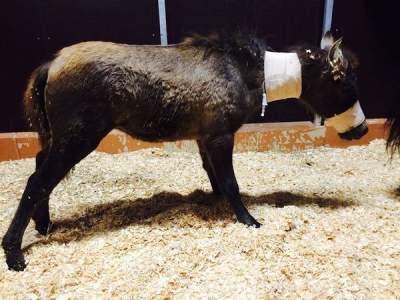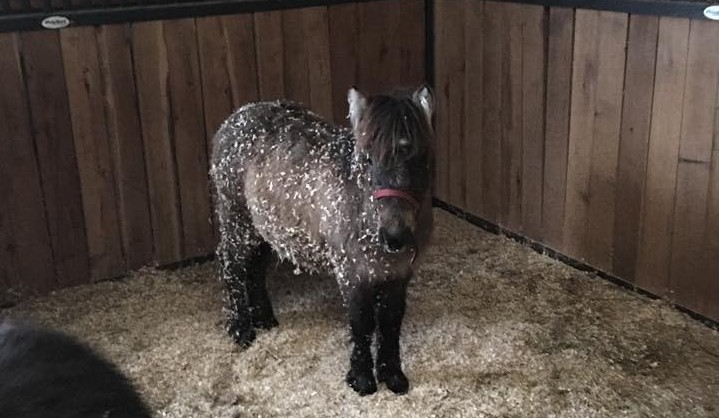 Tetanus is a severe bacterial infection that affects horses and often results in death if not caught early. For foals, the illness can be especially devastating. Squirt contracted tetanus after she was born and went through a long and demanding recovery process.
Tetanus is a severe bacterial infection that affects horses and often results in death if not caught early. For foals, the illness can be especially devastating. Squirt contracted tetanus after she was born and went through a long and demanding recovery process.
What is Tetanus?
Tetanus is a bacterial infection that attacks the nervous system. It is caused by the toxins produced from the bacteria Clostridium tetani, and is among “the most potent known microbial poisons” alongside botulism. It is most frequently found in the soil, but can also be found in:
- Feces
- Dust
- The intestinal tracts of animals and humans
The bacterium spores can live up to 40 years in these environments and germinate in an oxygen free environment. The germination, or reproduction, of the bacterium releases the toxins that are so deadly.
How Horses Contract Tetanus
In most cases, horses contract tetanus from a small cut or puncture wound, which is generally small and heals over quickly. Once the wound is healed over, the bacterium is in an oxygen free environment, motivating spore production. Once an unvaccinated horse is infected, it may take up to several weeks for symptoms to occur.
Foals like Squirt can be introduced to the bacterium via the umbilical cord if their mothers aren’t vaccinated since they are born without antibodies. They acquire antibodies by drinking colostrum, the first milk produced by the mare. In Squirt’s case, his mother was not vaccinated against tetanus, so she had no tetanus antibodies to pass along to Squirt. Unfortunately, the pair’s new owners were unaware Squirt’s mother hadn’t been vaccinated.
Signs of Tetanus
The symptoms of tetanus include:
- Stiffening muscles
- Inability to move jaw
- Sawhorse stance (seen photo top right)
- Slightly raised tail
- Muscle spasms brought on by sudden movement, touch, bright lights, or sound
- Third eyelid spasms
- Ears pulled downward
When Dr. Dawn Mrad was called to the farm after Squirt was found stuck with her legs through a tube gate, she described Squirt as “reluctant to move,” and noted that “she seemed to get both [hind] legs stuck behind her” when walking and “was reluctant to bend her hind legs.” Initially, the forelimbs showed no signs of stiffening. These symptoms were consistent with the onset of tetanus.
Treating Tetanus
Tetanus is a very serious condition. It is often fatal and humane euthanasia is often recommended. When the toxins begin to affect the nervous system, the muscles begin to spasm and stiffen to the point where they restrict the horse’s ability to breathe, which leads to suffocation.
To save a horse from this fate, aggressive treatment is required. Squirt and her mother spent 15 days in the hospital, some of which was in the ICU. Squirt’s care included:
- Round-the-clock monitoring
- A plasma transfusion
- Tube feeding before transitioning to hand bucket feeding
- IV fluids
- Tetanus antitoxin injections
- Antibiotics
- Lab work
- Other supportive care (including regularly assisting her to stand)
The antitoxin will only be effective if tetanus is caught early. Once the toxins adhere to the nervous system, the antitoxin is ineffective.
Be Aware of Complications
Like any illness, complications may arise. Being recumbent and unable to stand, may have contributed to a corneal ulcer Squirt developed and which required vigilant care. Managing the symptoms and complications that arise can become a daunting task. Thankfully, our great support staff of technicians and night attendants makes this level of care possible.
Tetanus Recovery Rate
Recovery from tetanus is a slow process. For horses that develop tetanus, the mortality rate can be as high as 50%. If they make it past day seven, their prognosis can be upgraded anywhere from fair to good. It may take as long as two weeks for symptoms to begin to resolve, but some symptoms may linger for up to a month.
After a couple of tough weeks in the hospital, Squirt was well enough to be released. A week later, Dr. Mrad performed a check-up on the farm and found Squirt doing remarkably well. She noted Squirt was “cantering and bucking around her pen” and her corneal ulcer had healed. At four months, Squirt is healthy and received her first set of vaccinations. She is not expected to have any long term affect from the illness.
Vaccinate Your Horses Against Tetanus
Protect your horse from tetanus with yearly vaccinations. Tetanus is a very expensive illness to treat and is an exhaustive process of around-the-clock supportive care. It can also be financially taxing or not feasible at all. The good news is you can protect your horse with an inexpensive, once a year vaccine for less than $20—a far cry from an expensive hospital stay. The small price of a vaccine far outweighs the cost of treatment and the heartache of euthanasia.
Squirt Happy & Healthy
